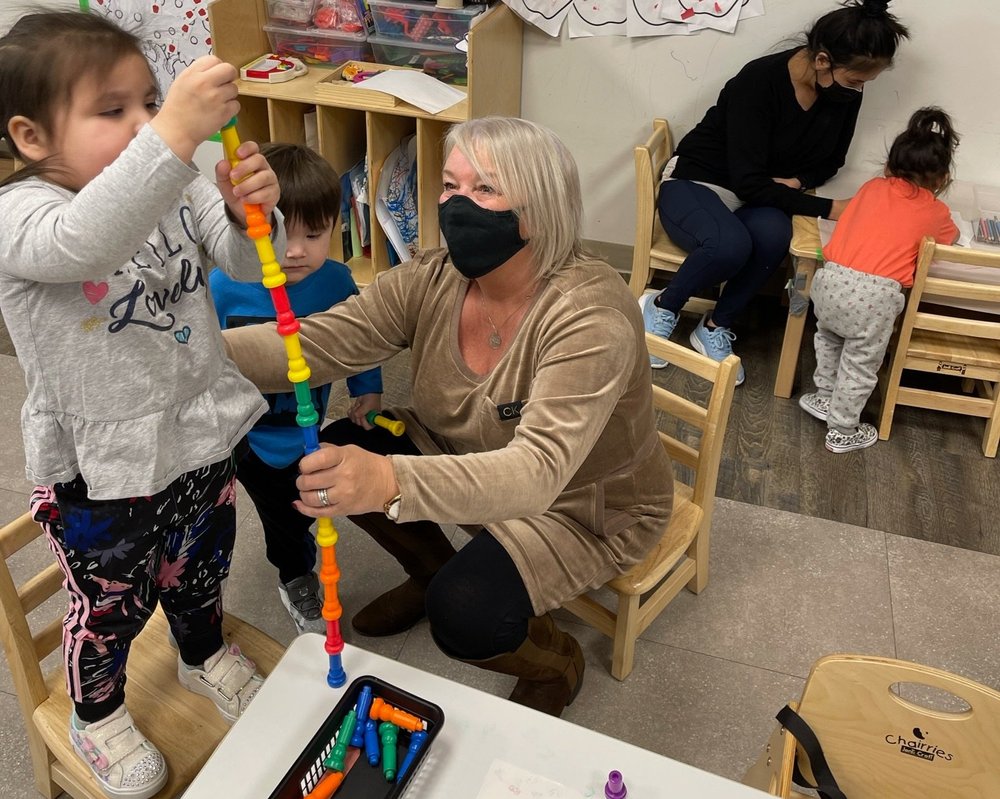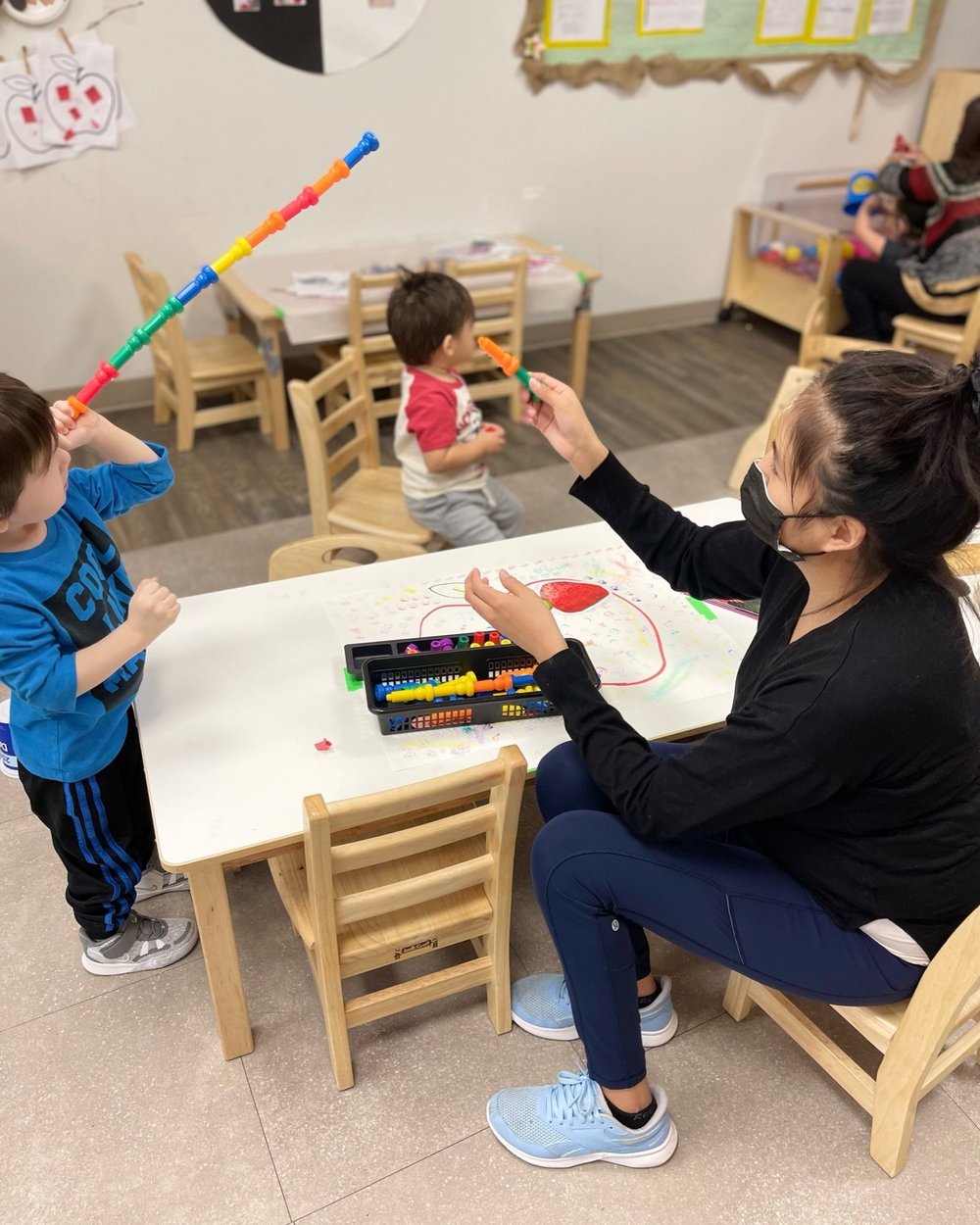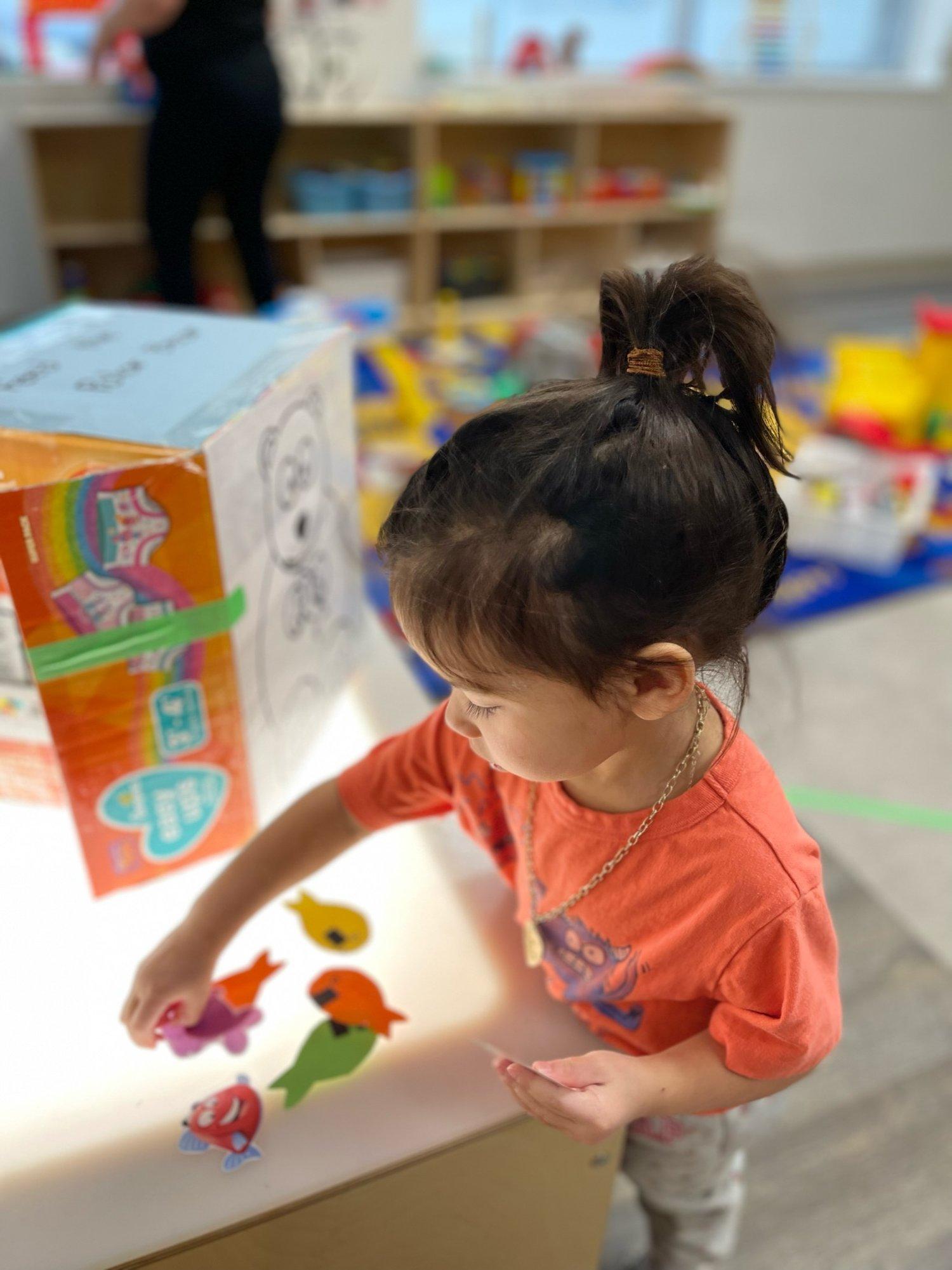At the Indigenous Child Care Program at Oliver Centre on Edmonton's west side, there is regularly an ooey-gooey mess of finger painting, bubble blowing and slime making going on.On any given day, the children in the program are busy interacting with each other, playing peek-a-boo and learning a mix of Cree and English.
It's a program that for years many families could only dream of having access to. Yet still today, due to the pandemic, and many family's inability to afford and access care, there is still one beautiful childcare room that sits empty without enrollment. Sue MacLean, is the centre's Executive Director which offers child care at 4 different centres across Edmonton. She's hoping the government's new childcare system will help fill enrollment spaces.
“That is absolutely the hope, that now more families will have access to the subsidy program and will say, ‘Yes I can now bring my children.'”

Sue MacLean, Executive Director of Indigenous Child Care Program at Oliver Centre
Beginning in January 2022, as a result of an agreement with the federal government, the Government of Alberta rolled out a new system to make early learning and child care more affordable. But while many are singing the praises of the new plan, it does leave lower-income families with out-of-pocket costs that may still be unaffordable and for those at lower income levels currently accessing care, the change in out-of-pocket costs will be almost negligible.
Oliver Centre used to be a $25/day childcare centre until they lost their funding, they have since become skilled at helping low-income families access childcare.
Maclean says of the new system, “It is going to make a huge difference for many of our families, the affordability grant piece will cut their fees in half. But for those families under the 95,000 dollar income level, they will see a difference, but it's not going to be huge.”
And that's the part of the agreement that Erick Ambtman, the Executive Director of EndPoverty Edmonton says needs to be addressed. EndPoverty Edmonton works with community groups and governments to advocate for an integrated system of high-quality, inclusive, and affordable early learning child care.
“Childcare has always been expensive in this province,” says Ambtman. “Under the new system, the families that are really going to benefit are middle-income families, not the ones who are most in need. It doesn't address some of the fundamental issues of quality affordable childcare.”
Rob Buschmann, a Research Associate with the Community-University Partnership for the Study of Children, Youth, and Families at the University of Alberta and a member of the Edmonton Council for Early Learning and Care agrees.
“The new system will reduce out-of-pocket costs for the vast majority of Edmonton and Alberta parents, but because those reductions are uneven, it risks leaving the lowest-income families behind. The new system still doesn't appear to provide enough assistance to make early learning and childcare affordable for many low-income families.“
- Rob Buschmann
Why won't low-income families still not be able to afford child care under the Alberta government's new affordable childcare system?
The new system, while more generous overall than the previous subsidy system, is also less sensitive to the family's need. This means that even though low-income families are getting a bit more help under the new system, it still leaves them having to pay a big chunk of their take-home pay to child care.
For example, take an Edmonton family with one preschooler and one infant in a child care centre charging median fees ($2,040 per month for both children together). If this family makes $100,000 per year, under the old system they paid about 27% of their take-home pay for child care. Under the new system, they pay about 6%. If this family makes $40,000 per year, under the old system they paid about 14% of their take-home pay for child care. Under the new system, they pay about 10%.
So both families are paying less now than they did before—but the family making $100,000 is getting a much more drastic cut than the family making $40,000. And the lower-income family is still paying about 10% of their take-home pay on child care, which many experts see as bordering on unaffordable. In Calgary, where fees are higher than Edmonton, a family making $40,000 per year will still pay about 23% of their take-home pay for child care under the new system.
“The new system reduces out-of-pocket costs for more families than before,” says Jeff Bisanz with the Edmonton Council for Early Learning and Care. “But for low-income families, as compared to higher-income families, affordability remains a significant barrier for many low-income families.”
EndPoverty Edmonton and its game-changing partner, the Edmonton Council for Early Learning and Care, have some recommendations it is asking the government to consider for addressing the uneven fee reductions and their effects.
Increase the amount of the income-based subsidy at lower incomes. This would immediately reduce the amount that lower-income families would pay out of pocket.
Implement a fee cap and subsidy system. If the children in this program continued to receive the subsidy with a fee cap in place, this would ensure many low-income families could access licensed childcare spaces.
Create a publicly funded ELCC system with no parent fees - similar to Alberta's existing public K-12 educational system. Such a system would eliminate parents having to pay any out-of-pocket fees altogether.

Building towers at Oliver Centre Child Care Program
What would the benefit be to implementing any of the above fee reduction options?
Removing barriers to childcare such as significantly reducing or eliminating childcare fees for low income families would allow more parents to enter the workforce or seek out educational opportunities. It could also provide an incredible opportunity to young children to be able to access quality child care at a time when their young minds are developing so fast.
EndPovertyEdmonton is encouraged by the Alberta Government's participation in the Federal Government's commitment to build a pan-Canadian Early Learning and Child Care system. The federal government's plan is set to, in the short-term, reduce parent fees by an average of 50% by the end of 2022, with a further long term goal of an average parent fee of $10/day daycare by the end of 2025/26.
But even if childcare becomes more affordable, there remain numerous barriers and a lot of work to be done to make childcare inclusive and accessible to all, including transportation, available spaces, qualified childcare educators and more.
Sue MacLean sees many of these barriers everyday at her centre. Unlike other childcare centres her centre has hired an Outreach worker to help the many Indigenous and newcomers families who use her care centre, to overcome some of those barriers. Issues of transportation means on many occasions they have purchased bus passes for families. Their Outreach worker has sat with families to fill out paperwork, apply for subsidies and even connects them with social services staff to assist them with filing taxes so they can even begin to qualify for subsidy programs. This while her Centre struggles to fill vacancies and staffing needs due to the effects of COVID-19.
"The child care system was already fragile and it has been further fractured by COVID,” says Erick Ambtman of EndPoverty Edmonton.
For example, there was a loss of almost 4000 early childhood educators within the system in the first year of COVID. Many educators left due to low pay and low enrolment at child-care centres due to the pandemic.
Christopher Smith is with the Muttart Foundation and the Edmonton Council for Early Learning and Care. He says, “The stabilization of existing regulated child care services in Alberta's child care sector has drawn considerable and necessary support from the various pandemic-related federal supports provided in 2020-21. But the phasing out or restructuring of these supports nationally, is taking place before the Alberta early learning and child care sector has recovered financially and operationally from low enrolments and disruptions in service delivery. To address childcare instability, the government should assess these issues, identify services most at risk and reallocate unspent provincial childcare funds from the 21-22 budget to address those needs. That should include investments in the childcare workforce. That would go a long way to stabilizing an already fragile childcare sector.”
EndPoverty Edmonton is currently involved in government budget consultations and is hoping to see these affordable and accessible childcare issues addressed in the upcoming Federal and provincial government budgets expected in the Spring.

About
EndPovertyEdmonton has identified early learning and child care as one of eight game changers that must be addressed if poverty is to be eliminated from Edmonton in a generation. EndPovertyEdmonton recognizes the need to work toward an integrated system of high-quality, inclusive and affordable early learning and child care. The Edmonton Council for Early Learning and Care (ECELC) was created to pursue this work and comprises institutional and community partners with expertise and experience in early learning and child care.

